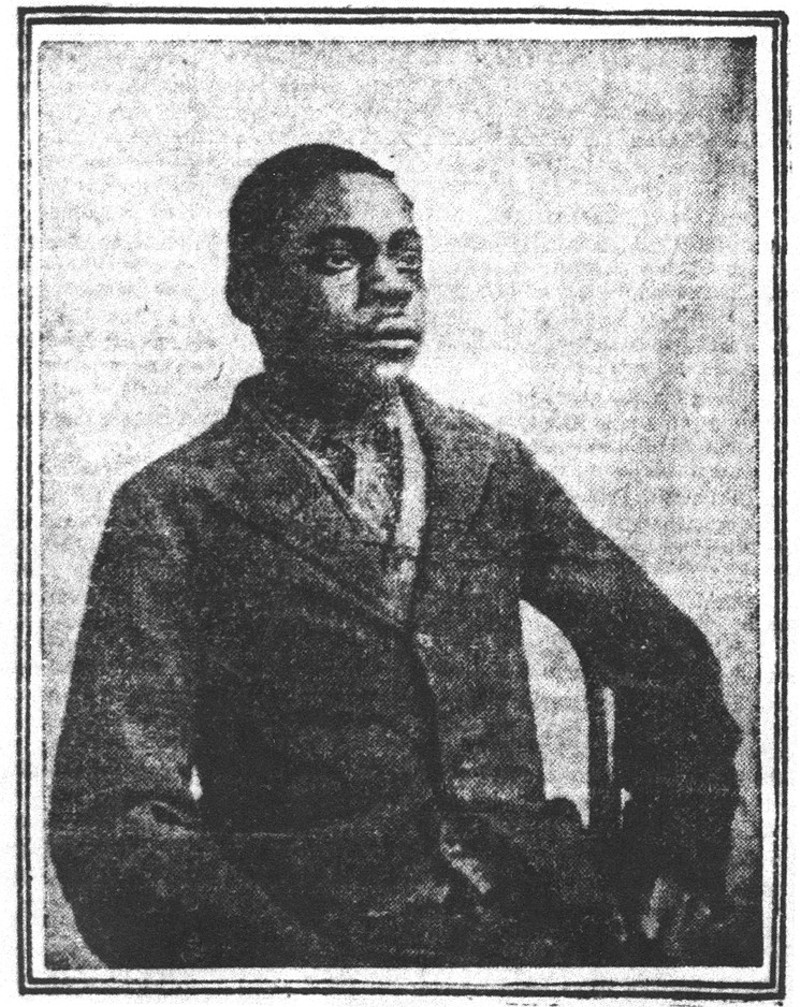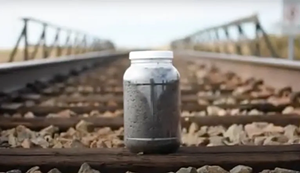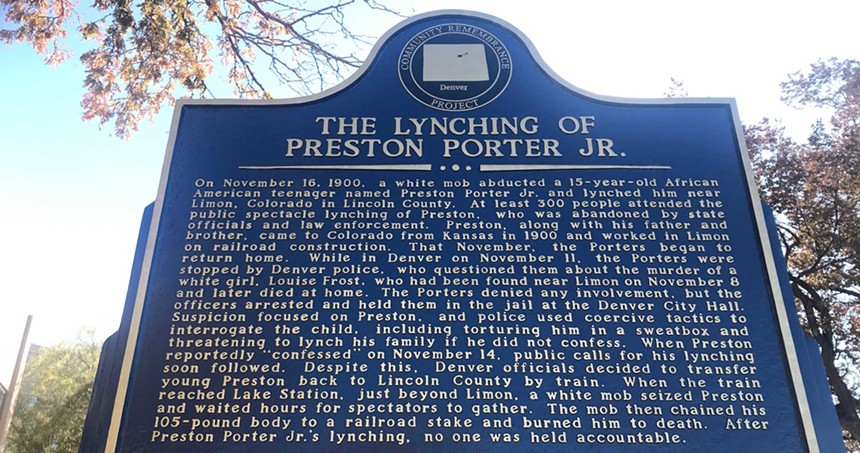"People should know that as progressive as our city may seem, we are just as complicit in some of the terrors and race-based harm," says Jovan Mays, Aurora's poet laureate emeritus. "For us to progress, in my opinion, we have to understand our history in order to graduate ourselves to the people we want to be."
Mays and two other members of the Colorado Lynching Memorial Project have traveled to Montgomery, Alabama, where the National Memorial for Peace and Justice opened in 2017. A project of the Equal Justice Initiative, the civil-rights group started by crusading Just Mercy author Bryan Stevenson, the memorial includes a Legacy Museum devoted to the nearly 6,500 victims of racial-terror lynchings between 1865 and 1950.
The museum was designed to include a display of glass jars filled with soil taken from spots where lynchings occurred, and organizers put out a call to community groups across the country to retrieve soil from other unmarked sites. In November 2018, the CLMP went to Limon, Colorado, to collect soil from the unmarked spot where Preston Porter was killed in 1900, in the state's last documented lynching.
The lynching followed the murder of twelve-year-old Louise Frost, daughter of a prominent rancher, which the Denver Post proclaimed “the most fiendish crime ever perpetrated in Colorado."
But as Alan Prendergast reported in his November 2018 Westword cover story, "Frost’s murder wasn’t even the most fiendish crime to be perpetrated that month. For pure sadism, for cold-blooded, premeditated, murderous intent, her death was easily overshadowed by the vengeance that followed. On November 16, Preston Porter Jr., a fifteen-year-old African-American railroad worker, was led by a rope around his neck to the spot where Frost had been found. Chained to an iron rail, with kerosene-soaked wood piled around him, he was burned alive while hundreds of people watched. Some of the crowd had come by train from Denver and Colorado Springs to attend the spectacle.
"This was not Spain under the Inquisition, Salem during the witch trials, or even antebellum Georgia. This was Colorado at the dawn of the twentieth century. Burning a teenager at the stake drew national attention, from San Francisco to the New York Times, and a range of editorial comments, from mild disapproval to deep revulsion. And then the whole episode was quickly, studiously forgotten."
But not today, which would have been Preston Porter's 140th birthday.
Today, Mays — who learned of Preston Porter's lynching through the 2018 Westword story — and others will conclude the last phase of a process that began years ago. It started with gathering that soil at the lynching site, then installing a plaque at the spot at 13th and Larimer streets where Preston Porter was jailed and beaten into confessing to the crime, then hosting a student essay contest.
At a formal ceremony this morning, they will finally add that jar of soil to the collection at the Legacy Museum and share Preston Porter's story; a representative of the Equal Justice Initiative will talk about how those dark days still cast a shadow on this country.
And then Mays will read this poem:
“To Preston”
By Jovan Mays (a commission for the Equal Justice Initiative in conjunction with the National Lynching Museum)
Sometimes I wonder at what age do we know our songs?
At what time do our bodies become our melodies, our cadences, our chords?
I can still hear my grandma humming a melody into a meal.
I wonder what your dad sang, Preston, to trick you and your brother’s hunger into bedtime.
To trick the house into cradling itself to sleep
Yeah, sometimes I wonder
I wonder if we all have the same fascinations of fire
Lord knows you must not
The act of putting a fresh log into a stove and watch the house cradle itself to sleep
Did you ever wonder where embers go?
Have you imagined their return to the sun?
I hope you did, Preston.
A star ain’t nothing but a fire.
You know I have gathered lumber for long winters,
and I know you know such work
How to get into a log-hurling rhythm.
How to trick up the speed to stack fast.
They call a full bed of firewood a chord
and four full chords should get you through the winter
But there’s those chords again,
Did you get to know your song, Preston?
They say in music a chord is a harmony of three notes,
and I think about you, signing the pages of the Gospel of Luke and handing them to your future executioners.
And how they used those as invitations to your concert,
Your solo on the stake,
Your terror on that tie,
The cadence of your chains,
The choral of your kerosene,
Accenting a symphony of splinters,
As your throat became their justice.
Do you think they heard you, Preston?
Did they register the register of your wails? Your weeping. Did they, Preston?
Did they hear your family in your lungs?
Did they see your human as your skin molted?
Did they catch the signals in your smoke?
On the Eastern Plains of Colorado, the wind can be spellbinding.
Some say it can even sweep,
and Lord, how we saw them sweep you, Preston.
Under our flagged rug,
swept your remains so that you would not.
But I think of a sweep, Preston
How it can be lifting,
how it can carry you when you can’t carry yourself
Oh, I know wind.
Out here in these plains, they farm wind
To recharge.
Turnbinded, they watch their houses cradle themselves to sleep
And at night, when it’s just you and the moon,
if you listen real deep, you’ll hear the wind howl.
They say that wolves wail to the sky to call the pack
And what else is a howl, but a song?
Calling us in, to a choir of chords
Bottled in confession and confusion
Teenaged and tormented
Wondering if it was ever heard
And somewhere,
In all that brimstone,
In all that char,
In that holocaust combustion,
Was a song
Constructed by a Preston Porter, Jr.
We learn your chords
on the Eastern Plains every time we hear this wind,
Calling us in, reminding us,
That we have some songs to teach.
There isn't time to get to Alabama for the ceremony, but you can visit the plaque at 13th and Larimer, read the Westword story about the lynching, and remember Preston Porter.
[
{
"name": "Air - MediumRectangle - Inline Content - Mobile Display Size",
"component": "12017618",
"insertPoint": "2",
"requiredCountToDisplay": "2",
"watchElement": ".fdn-content-body",
"astAdList": [
{
"adType": "rectangle",
"displayTargets": "mobile"
}
]
},{
"name": "Editor Picks",
"component": "17242653",
"insertPoint": "4",
"requiredCountToDisplay": "1",
"watchElement": ".fdn-content-body",
"astAdList": [
{
"adType": "rectangle",
"displayTargets": "desktop|tablet"
},{
"adType": "rectangle",
"displayTargets": "desktop|tablet|mobile"
}
]
},{
"name": "Inline Links",
"component": "18838239",
"insertPoint": "8th",
"startingPoint": 8,
"requiredCountToDisplay": "7",
"maxInsertions": 25
},{
"name": "Air - MediumRectangle - Combo - Inline Content",
"component": "17261320",
"insertPoint": "8th",
"startingPoint": 8,
"requiredCountToDisplay": "7",
"maxInsertions": 25,
"watchElement": ".fdn-content-body",
"astAdList": [
{
"adType": "rectangle",
"displayTargets": "desktop|tablet"
},{
"adType": "rectangle",
"displayTargets": "desktop|tablet|mobile"
}
]
},{
"name": "Inline Links",
"component": "18838239",
"insertPoint": "8th",
"startingPoint": 12,
"requiredCountToDisplay": "11",
"maxInsertions": 25
},{
"name": "Air - Leaderboard Tower - Combo - Inline Content",
"component": "17261321",
"insertPoint": "8th",
"startingPoint": 12,
"requiredCountToDisplay": "11",
"maxInsertions": 25,
"watchElement": ".fdn-content-body",
"astAdList": [
{
"adType": "leaderboardInlineContent",
"displayTargets": "desktop|tablet"
},{
"adType": "tower",
"displayTargets": "mobile"
}
]
}
]














